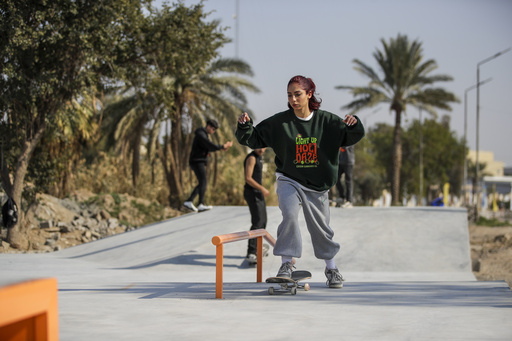BAGHDAD — The streets of Baghdad, once plagued by car bombs and militant violence, have experienced a significant reduction in conflict compared to the chaotic years following the downfall of Saddam Hussein and during the intense campaigns against the Islamic State group. Despite this improved security, many young Iraqis continue to feel their prospects for personal and professional growth are limited.
With a population nearing nine million, Baghdad has made strides in revitalizing public parks and cultural venues. However, initiatives aimed specifically at engaging the youth in urban development have often been sidelined. Recently, this trend seems to be shifting for the better.
This past weekend, the capital celebrated the opening of its first skate park amidst a gathering of foreign diplomats, sports officials, and local young athletes, marking what many hope is the start of a broader initiative to create more recreational and cultural spaces for the youth.
“I have been waiting for this moment for five years,” expressed Mohammed Al-Qadi, 19, who was among the inaugural visitors of the skate park on its first day. Al-Qadi, like his fellow skateboarders, previously practiced in public areas such as Al-Zawraa Park and Abu Nawas Street. These locations were fraught with challenges, as skaters frequently faced harassment from authorities, hazardous collisions with vehicles, and injuries due to unsuitable conditions.
“Previously, we often had to move or risk injury because no proper facilities existed,” he explained. “Now that we have this safe space, I truly hope this marks the beginning of more to come.”
The skate park, which resides within the Ministry of Youth and Sports complex adjacent to Al-Shaab International Stadium, was constructed in just three weeks with the help of the German and French embassies. This development highlights a growing global interest in enhancing Iraq’s sports facilities, not just for traditional sports like soccer but also for alternative activities.
Al-Qadi and his peers are now advocating for the establishment of a national skating federation, which they believe could enable them to participate in international competitions, including the Olympics. “Currently, we have 25 male and female skaters, and I am confident that this number will only increase with the new park,” remarked Al-Qadi.
The new facility has also ignited excitement among female skaters, even as social attitudes toward women engaging in such sports remain somewhat resistant, as skateboarding is often considered rough and sometimes perilous. “Now that we finally have a place to train, I aspire to compete internationally,” said 23-year-old Rusul Azim, who attended the inauguration dressed in sportswear and a hijab.
Although skating is not as widely popular in Iraq as soccer or other conventional sports, Azim believes the presence of the new skate park will motivate more individuals, particularly women, to participate in the activity.
Zainab Nabil, 27, also attended the opening despite her family’s disapproval of her involvement in skating. “I am here to demonstrate that women can actively partake in this sport as well,” she stated, adding, “I hope there will be designated days for women and men so that more girls will feel encouraged to join.”
At its core, the skate park represents a modest yet vital progression in offering Iraq’s youth a space of their own. Many individuals are optimistic that this will be the first of numerous similar developments.
“We need more venues like this—safe places where young people can engage in activities, express their creativity, and aspire to larger dreams,” concluded Al-Qadi.



